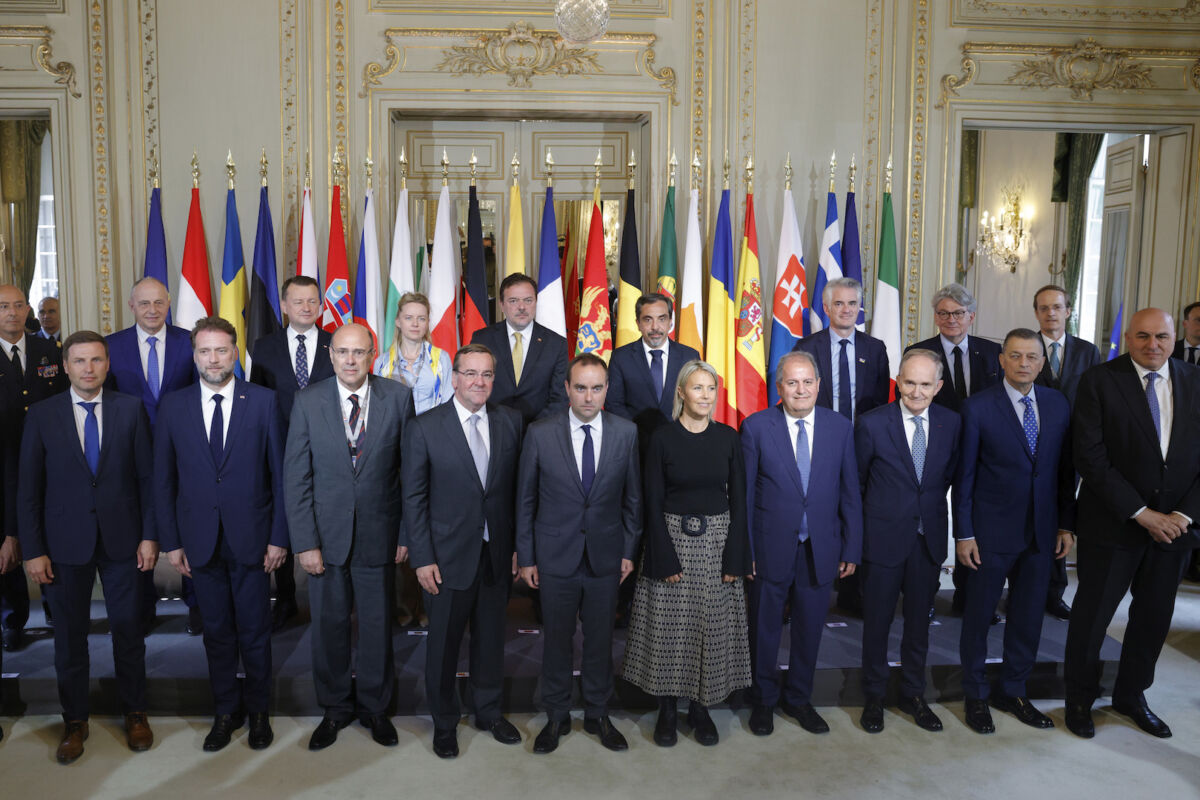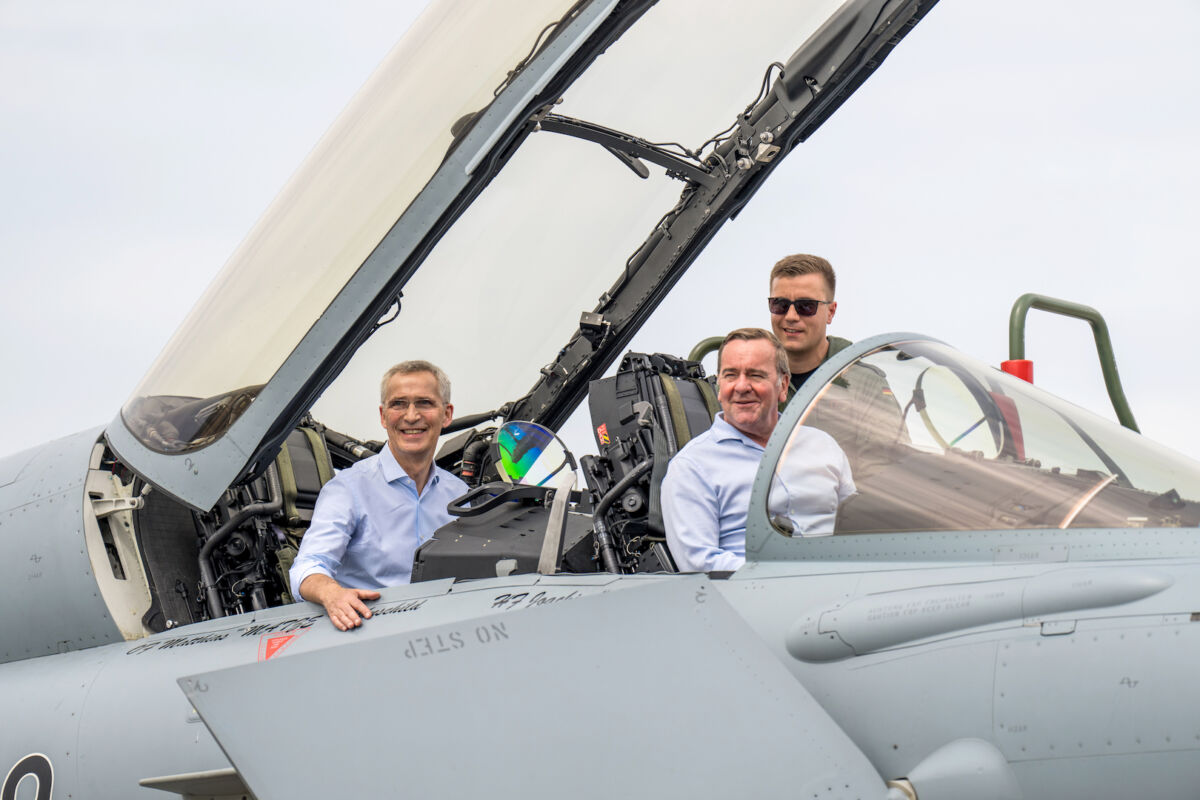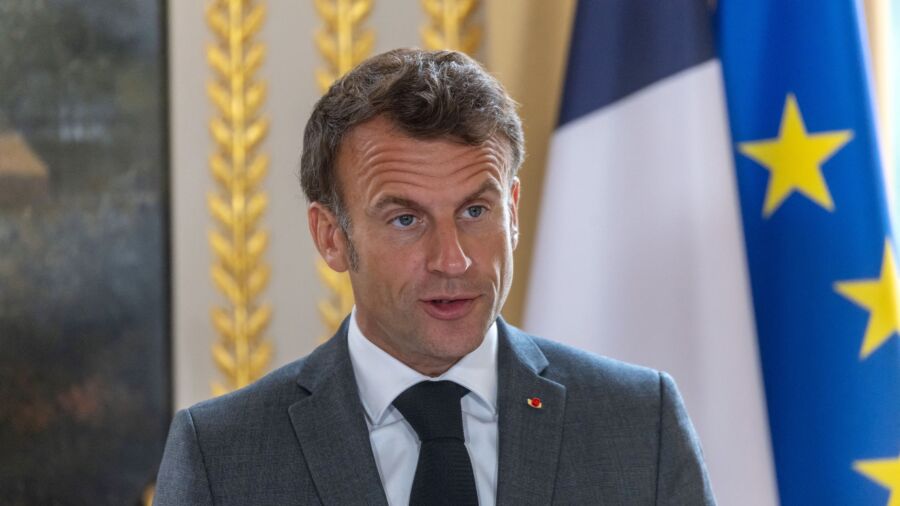French President Emmanuel Macron emphasized the importance of European independence on Monday by calling on France’s EU allies to look at a more home-grown air defense strategy in order to avoid becoming over-reliant on defense systems purchased outside of Europe.
“When we talk about air defense, we would be wrong to rush into [increasing] capacity,” Macron said at a news conference in Paris after meeting with defense ministers and other representatives of 20 European countries.
“The question is, first of all, strategic. It consists of knowing the state of the threats, what we can realistically defend, and which strategy we want to pursue,” he continued. “And then, what we, as Europeans, have the capacity to produce and what we must then buy. Because if we have an approach based solely on capacity, we would right away buy what’s available even if it’s not useful—and that generally means buying massive amounts of non-European products.”
Macron’s one-day meeting with ministers was held on the sidelines of the Paris Air Show, the world’s largest aviation event that focuses on the space industry and air defense.
Among the countries that took part in the meeting were Germany, the United Kingdom, and Sweden, as well as Ukraine neighbors Poland, Slovakia, Hungary, and Romania. Representatives of the North Atlantic Treaty Organization (NATO) and the European Union (EU) also attended.

Macron pushed for EU defense equipment manufacturers to build independent military systems and relocate production on the continent. He also called for enhanced European standards.
“Why do we still need to buy American too often? Because Americans have standardized much more than we have, and they themselves have federal agencies that provide massive subsidies to their manufacturers,” he said.
Macron’s move emphasizing EU sovereignty comes in the wake of Germany’s deal to jointly purchase air defense systems that partly come from the United States and Israel.
‘Not Convinced’
The German-led plan—dubbed the “European Sky Shield Initiative (ESSI)”—was spearheaded by Berlin in October and unites 17 EU states and the United Kingdom. The initiative will allow all participants to jointly develop air and missile defense systems using a multinational and multifaceted approach, offering a “flexible and scalable way for nations to strengthen their deterrence and defence in an efficient and cost-effective way,” a NATO statement reads.
The French government has been openly critical of Germany’s initiative because France believes the project doesn’t preserve the EU’s sovereignty. The ESSI is expected to largely feature U.S. and Israeli military industries, such as Israel’s Arrow 3 system and the already-existing U.S. Patriot missile systems.
German Defense Minister Boris Pistorius, who also attended the Paris meeting, said on Tuesday that Berlin is “not convinced” by Macron’s vision for Europe’s air defense capabilities. His comments come a day after Macron announced Monday that five European countries—France, Belgium, Cyprus, Estonia, and Hungary—signed a letter of intent for the joint purchase of France’s infrared homing short-range air defense system dubbed Mistral.
“Macron’s conception seems to be: ‘We are not in such a hurry that we need to build on bridge technologies and we can wait until what we develop in Europe is ready.’ We, along with several others, are not convinced about that,” Pistorius said.
“We won’t move away from that deal and we don’t buy anything because of tradition or history. We buy that system because it’s just very good and the best thing I know,” he continued. “We will stay with it. How long? I can’t give you guarantees for the next two decades, but anyway, as long as we are responsible—and that means the next [few] years—we will stay with Arrow because it’s very good.”
NATO Secretary General Jens Stoltenberg, joined by Pistorius, said at a news conference at Germany’s Jagel Air Base on Tuesday that he believes EU states should be able to decide independently which kind of air defense systems they want to purchase.

“It’s a national decision by each and every ally exactly what kind of system they decide to invest in. So that’s a German decision,” he said. “But what we do at NATO is that we agree to capability targets. So we have agreed that allies need to invest more in air defense, and therefore I welcome the German initiative.”
Spending on defense has been a recurrent bone of contention between the two countries, with France complaining that Germany wasn’t doing enough in the area for years, until the war in Ukraine led Berlin to announce a major boost to military spending.
It also isn’t the first time Macron called on France’s EU allies to think twice before investing in military equipment manufactured outside of Europe. On several occasions in recent months, he has urged EU states to move toward developing their own strategic autonomy, rather than relying on the United States through NATO.
Meanwhile, Macron said on Monday that the Franco-Italian MAMBA anti-missile system is “now deployed and operational in Ukraine.” The delivery of the system to Kyiv was announced by Paris and Rome in February. The MAMBA system is part of NATO’s integrated air and missile defense.
The Associated Press and Reuters contributed to this report.

